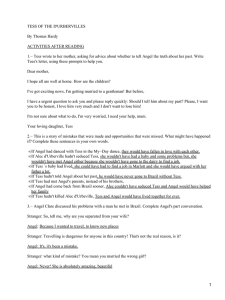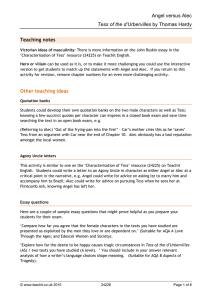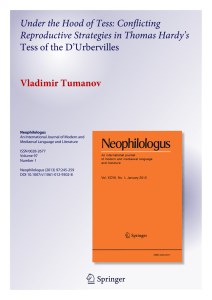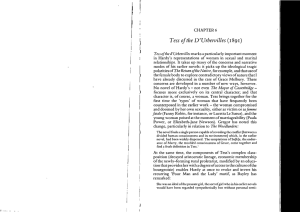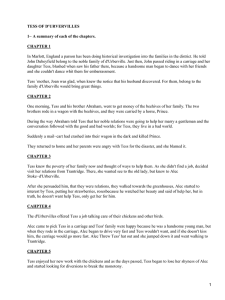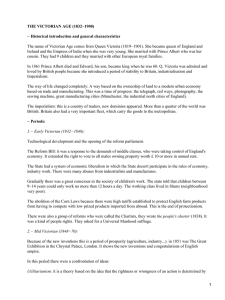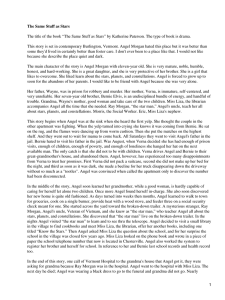SAAR.DINE - Universität des Saarlandes
Anuncio
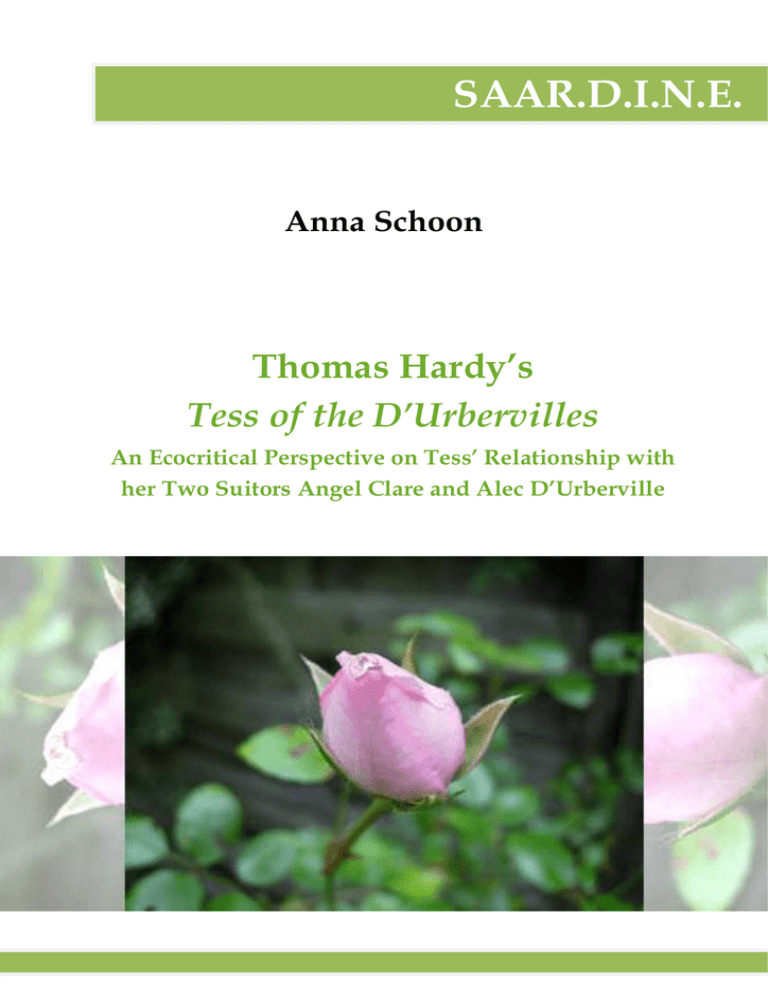
SAAR.D.I.N.E. Anna Schoon Thomas Hardy’s Tess of the D’Urbervilles An Ecocritical Perspective on Tess’ Relationship with her Two Suitors Angel Clare and Alec D’Urberville SAAR.D.I.N.E. Saarbrücker Digitale Interdisziplinäre Nachwuchsbeiträge zum Ecocriticism Band 5 Saarbrücker Digitale Interdisziplinäre Nachwuchsbeiträge zum Ecocriticism Band 5 Herausgeberin | Editor Solange Landau Redaktion | Editorial Office Jonas Nesselhauf Postadresse | Postal Adress Universität des Saarlandes FR 4.1, Lehrstuhl für Allgemeine und Vergleichende Literaturwissenschaft Fachschaftsrat Komparatistik Postfach 151150 66041 Saarbrücken http://www.uni-saarland.de/lehrstuhl/solte-gresser/studium/fachschaft.html Die Schriftenreihe für Nachwuchsforschung im Bereich der ökokritischen Literaturwissenschaft ist ein Projekt des Fachschaftsrats am Lehrstuhl für Allgemeine und Vergleichende Literaturwissenschaft der Universität des Saarlandes. Die Richtlinien zum Einreichen von Beiträgen und Hinweise für Autorinnen und Autoren finden sich online. Manuskripte auf Deutsch oder Englisch werden in digitaler Form erbeten: [email protected] Umschlagfoto: Solange Landau Anna Schoon Thomas Hardy’s Tess of the D’Urbervilles An Ecocritical Perspective on Tess’ Relationship with her Two Suitors Angel Clare and Alec D’Urberville 1. Introduction …………………………………….………………….………….… 6 2. The Concept of Nature in Tess ……….………….……………………….…… 6 3. Tess as Embodiment of Nature ……………………………………………….. 8 3.1 Implications ………………………………………………………………… 10 4. Angel Clare, Tess and Nature ………………………………………………… 10 5. Alec D’Urberville, Tess and Nature ………………………………………….. 13 6. The Ending of the Novel ………………………………………………………. 15 7. Conclusion ………………………………………………………………………. 17 This paper has been written in the context of a postgraduate seminar on Thomas Hardy’s novels Tess of the D’Urbervilles and The Mayor of Casterbridge. The course mainly focused on close readings of the texts in the tradition of New Criticism, allowing students to develop their own thoughts independently from wellestablished literary criticism and canonical interpretations. In addition to some background knowledge gained during an undergraduate seminar on ecocatastrophe in contemporary American novels, three secondary sources provided some guidance when approaching Hardy’s novels from an ecocritical perspective: Greg Garrard’s Ecocriticism (London and New York: Routledge, 2009); Richard Kerridge’s “Ecological Hardy” in Beyond Nature Writing: Expanding the Boundaries of Ecocriticism edited by Karla Armbruster and Kathleen R. Wallace (University Press of Virginia, 2001, S. 126-142); and Val Plumwood’s “Ecofeminism: An Overview and Discussion of Positions and Arguments“ published in the Australian Journal of Philosophy (Supplement to Vol. 64, 1986, S. 120-138) on which chapter 3.1 of this paper — implications of Tess’ identification with Nature — is loosely based. Page numbers in this essay refer to the Penguin Classics edition published in 2003. Anna Schoon schloss ihr Grundstudium in Kultur und Wirtschaft (Englisch und VWL) 2012 an der Universität Mannheim ab und studiert derzeit Britische Literatur- und Kulturwissenschaft im Haupt- und Allgemeine und Vergleichende Literaturwissenschaft im Nebenfach an der Universität des Saarlandes. Ihre Forschungsinteressen sind unter anderem kulturelle Identität und Alterität in zeitgenössischen Erzähltexten sowie Postkolonialismus. 1. Introduction Tess of the D’Urbervilles (henceforth Tess), one of Thomas Hardy’s major novels, was first published in 1891 and has been controversially discussed among readers and scholars since that date. One of the main controversies has always been Tess’ relationship with her two suitors, Angel Clare and Alec D’Urberville, which has mostly been explained on the basis of the characters’ personalities and unlucky coincidences. In this paper, however, their relationships will be approached by combining them with a second very prominent aspect of the novel, namely Nature. Nature is attributed a considerable amount of space in the novel, mainly in the form of landscape descriptions, rural life, outdoors in general and animals. Tess is not only constantly characterised through natural aspects, but partially even becomes one with her natural environment. Simultaneously, both male characters have very distinct attitudes towards Nature, which is mirrored in their respective treatments of Tess. In this paper, it will first be explained how the term ‘Nature’ is to be understood in the novel. Tess’ connection with Nature will be analysed in detail, before presenting its implications: identifying Tess (and femininity in general) with nature and attributing masculinity to the sphere of ‘mankind’ creates a hierarchical structure, which can be used to ‘justify’ female submission to (supposed) masculine dominance. In this context, Alec subjects Tess and Nature by violence and brute force, whereas Angel displays spiritual and intellectual superiority. His career goals in contrast to his limitless idealisation of Tess and Nature play an important role as well. This approach also provides an interesting perspective to the ending of the novel. Tess murdering Alec can be understood as Nature breaking free from suppression driven by survival instincts, whereas Tess’ surrender to (human) justice represents her rejection of Angel’s idealisation as well as a reconcilement with society and its rules. 2. The Concept of Nature in Tess The concept of Nature in the novel can be illustrated by analysing the use of the terms ‘Nature’, ‘nature’ and ‘natural’. Hardy sketches a very complex and multifaceted understanding of Nature, which includes a variety of elements ranging from very positive to very negative connotations of the terms. First of all, there are occasions where those words are used in an ‘ordinary’ sense, namely in terms of understandable, straightforward or conventionally accepted features, the former illustrated by the example of the priest at Marlott who refuses to bury Tess’ baby 6 (“the natural feeling of a tradesman at finding that a job he should have been called in for had been unskillfully botched by his customers” (96)), the latter by the “natural energy of Tess’s years” (104) and the “natural shyness of young couples” (252). In the case of “natural shyness of the softer sex” (13), mentioned when introducing the ‘club walking’, it is not perfectly clear whether it might refer to a conventionally accepted feature of women or a (supposed) biological fact being the third way of using the terms. “Nature” is also used as a synonym for “character,” for example “childish nature” (191), “good-natured” (276) or “differing one from another in natures and moods” (140). So far, ‘nature’ mostly referred to human-related issues, but organic nature — flora, fauna, outdoors in general, weather, landscape etc. — is important too. Yet, the novel also includes Nature’s sublimity. Many representations of Nature are more than mere landscape descriptions, as they serve to emphasise the smallness of humanity in comparison to Nature. It also has a temporal aspect, which hints at the evanescence of humans, while Nature continues unimpressed by human activities, in this case Tess’ grief and suffering: Meanwhile the trees were just as green as before; the birds sang and the sun shone as clearly now as ever. The familiar surroundings had not darkened because of her grief, nor sickened because of her pain. (91) It is particularly interesting that the term ‘Nature’ is often mentioned in opposition to social laws and conventions. Thus, Tess is “ashamed of herself […] based on nothing more tangible than a sense of condemnation under arbitrary law of society which had no foundation in Nature” (279) and her baby is described as “Sorrow the Undesired – that intrusive creature, that bastard gift of shameless Nature who respects not the civil law” (96). Sorrow in this case becomes the product of a biological, anatomical (‘natural’) process which cannot be subdued by society’s rules and conventions. This effect is even enhanced in other passages, in which Nature appears as personified entity bringing mischief: “Yet such is the vulpine slyness of Dame Nature, that, till now, Tess had been hoodwinked by her love for Clare” (244) and “Nature, in her fantastic trickery, had set such a seal of maidenhood upon Tess’s countenance that he [Angel] gazed at her with a stupefied air” (237). Tellingly, the female pronoun is attributed to Nature, which will be particularly interesting in the following chapter. However, the image of the vulpine-like, sly ‘Dame Nature’ is remarkable, as two ‘social’ concepts are used to explain something which is regarded as being the opposite of society. On the one hand, Nature is personified, but instead of simply becoming a ‘person’ or a ‘woman’, the image of a femme fatale is evoked. On the other hand, ‘Dame Nature’ is described with animal vocabulary (“vulpine slyness”) or rather a feature which people 7 generally attribute to foxes, but which does not necessarily hold true in reality (or nature). Analysing the explicit use of the terms ‘Nature’, ‘nature’ and ‘natural’ has provided an overview over the concept of Nature in Tess. ‘Natural’ can — in most cases — be read as an opposite to social conventions and rules, whereas ‘nature’ regularly refers to character of persons and objects as well as to organic nature, rural life, landscape or surroundings in a very positive sense. Additionally, Nature’s sublimity and grandeur in contrast to humanity is evoked. However, ‘Nature’ is often personified, especially in the context of Nature being a negative influence from outside of society, which cunningly deceives people and leads them into difficulties. All these different aspects contribute to the complexity of the concept of Nature conveyed in the novel, which will be very relevant when trying to understand Tess and her relationships with Angel and Alec. 3. Tess as Embodiment of Nature Nature is regularly used as a means to characterise Tess. Animal comparisons are very frequent; Nature is presented as her refuge in times of troubles (cf. 47, 89, 103, 177), and there are many scenes in which Tess becomes part of her natural surroundings. In terms of animal metaphors, Tess is in most cases compared to birds: “like a fascinated bird” (122), “a sparrow’s gaze” (332). The “caged bird” (381) image mirrors Tess’ status in society: a free spirit limited by social rules and conventions which prevent her from pursuing happiness, even though it also hints at the fact that it might be safer for Tess to stay in her own small world than to leave it. In contrast, Tess is also compared to a cat: “She went stealthily as a cat through this profusion of growth” (122), stressing her effortless and gentle movements in a domain where she feels at ease. Her closeness to Nature can also be illustrated by her attitude towards animals, especially the dying pheasants which a shooting-party had left behind (cf. 278 f.). Despite Tess’ tendency to remain passive, she acts immediately and determinedly. Instead of turning away in disgust or fear, she “killed the birds tenderly”, “with the impulse of a soul who could feel for kindred sufferers as much as for herself” (both 279). The pheasants are no lesser creatures in her eyes, but of her kind. She even relativises her own sufferings because of the animals’ agony and pain: “’And not a twinge of bodily pain about me! I am not mangled, and I am not bleeding, and I have two hands to feed me and clothe me.’ She was ashamed of herself” (279). 8 Tess does not only see animals as “kindred”, but she also feels “akin to the landscape” (102). She regularly becomes part of the nature scenery itself: “Her quiescent glide was of a piece with the element she moved in[, h]er flexuous and stealthy figure became an integral part of the scene” (85). However, the narrative voice of the novel repeatedly points out that Tess does not perceive herself in the same manner, especially when thinking about society and her role in it: But this encompassment of her own characterization, based on shreds of convention, peopled by phantoms and voices antipathetic to her, was a sorry and mistaken creation of Tess’s fancy — a cloud of moral hobgoblins by which she was terrified without reason. It was they that were out of harmony with the actual world, not she. Walking among the sleeping birds in the hedges, watching skipping rabbits on a moonlit warren, or standing under a pheasant-laden bough, she looked upon herself as a figure of Guilt intruding into the haunts of Innocence. But all the while she was making a distinction where there was no difference. Feeling herself in antagonism she was quite in accord. She had been made to break a necessary social law, but no law known to the environment in which she fancied herself such an anomaly. (85 f.) As an ‘ordinary’ person, a social individual, Tess wants to belong and have a place among her fellow beings, which is why she worries about her supposed misplacement. Tess might not be aware of how her actual closeness to Nature, as she might perceive it as an affinity or general liking of her rural environment. Yet, she used to be a full member of the community as a school girl, but she soon distanced herself from her light-hearted attitude, when seeing her family’s difficulties regarding the number of children (cf. 37). Her thoughtfulness and sense of responsibility set her apart from her peers, but she enjoys farm work because of its closeness to Nature. This growing gulf between Tess and society becomes unbridgeable after the rape: whereas Tess has not committed any crime according to Nature, being an unmarried girl-mother is unforgivable according to social rules and conventions. There is another facet of Nature and Tess. She does not only share the gentle, harmonious features of Nature, but a strong survival instinct. It is this instinct which helps her — amongst others — to continue despite all hardships. More importantly, the survival instinct enables her to resist Alec’s domination (temporarily) and break free from him in the end, or less romantically put: to kill him. Further details for this aspect will be provided in a later chapter. 9 3.1 Implications So far, it has been shown that Tess is not only characterised through natural aspects, but also becomes an embodiment of Nature itself in several scenes. Even though no other individual female character is identified with nature as explicitly as Tess, the narrative voice extends its notion of Tess being (part of) Nature to field-women in general: “the charm which is acquired by woman when she becomes part and parcel of outdoor nature, and it not merely an object set down therein as at ordinary times. A field-man is a personality afield; a field-woman is a portion of the field” (87 f.).Yet, this difference between field-men and field-women is not unproblematic. Attributing femininity the role of Nature itself and masculinity representing the position of a “personality”, establishes a hierarchical relationship between the sexes. Against the background of technical and scientific innovations, industrialisation and the development of large cities, people are no longer at Nature’s mercy; they rather subject Nature according to their needs. Admittedly, agricultural spheres and hence food supply still depend on Nature (cf. a few garlic plants spoiling large quantities of milk at Talbothays, 138 f.), but in general it is people exploiting soil and animals. Thus, Tess being equated with Nature as shown above would be part of the inferior side of this Nature/Culture dualism, whereas male characters would belong to the (supposedly) superior side. The three male characters ‘exploiting’ Tess are Alec, Angel and farmer Groby. However, Groby should be regarded as a special case: he has no sexual interest in Tess and mainly mistreats her because of his resentments towards Angel. Tess also observes that “he did not harass the other women of the farm” (319), but that she can handle this “master […] of stone”, because “[h]e’s not in love with [her] (319, original emphasis). Among the three male characters, Groby is related to Nature the closest, as he makes his living of it, but he might be too much of a businessman to appreciate Nature beyond agricultural necessities. Alec and Angel are more interesting: their respective treatments of Tess mirror their individual understandings of Nature. 4. Angel Clare, Tess and Nature Angel’s attitude towards Nature and nature-related life mirrors his treatment of Tess, as he oscillates between idealisation, abandonment and usefulness for his career. In the beginning of the novel, Angel is depicted as enjoying outdoors as a pleasant past-time while not showing any particular appreciation for it. He and his brothers take a walking tour, but seem to be more concerned with discussing a 10 religious book than with Nature (cf. 16 f.). At Talbothays, Angel learns to like Nature and rural life. However, his motivation for being there are economic reasons, as he tries to start a career in agricultural business. He is “mastering dairy-work” (113) and other agricultural skills “with the view to the Colonies, or the tenure of a home-farm, as circumstances might decide” (114). The expressions “master” and “with view to” clearly depict that he is ambitiously working towards a goal emphasising his lack of close attachment to Nature. His choice of becoming a farmer can also be interpreted as a necessity, because he refuses a religious vocation, is member of a social class too high for manual labour and shuns big cities due to his former experience (cf. 116). His attitude and motives make Angel an outsider in natural space, which can be illustrated with the description on his second appearance in the novel: “He wore ordinary white pinner and leather leggings […]; but this was all his local livery. Beneath it was something educated, reserved, subtle, differing.” (111). However, this attitude changes. His indifference with which he formerly encountered the spheres of Nature is now replaced by (temporary) excited idealisation: Unexpectedly he began to like the outdoor life for its own sake, and for what it brought, apart from its bearing on his own proposed career. […] he became wonderfully free from the chronic melancholy […] He grew away from old associations, and saw something new in life and humanity. Secondarily, he made close acquaintance with phenomena which he had before known but darkly — the seasons in their moods, […] and the voice of inanimate things” (118, emphasis added). The personifications at the end of this quote emphasise Angel’s exaggerated and “unexpected” alteration: whereas Angel was not particularly interested in Nature in the beginning, he now believes to hear the voice of trees and stones as well as feel the moods of abstract calendrical concepts. Angel’s attitude towards Tess shows the same features as the one towards Nature: he learns to like her; he exaggeratedly idealises her, and he is concerned with her suitability for his career. At Talbothays, he singles her out among all other dairymaids who did not overly impress him. It is her voice which catches his attention in first place, but the content of her speech captures him as well. Tess’ statement about the soul being able to leave the body appeals to Angel’s spirituality. Her good looks do the rest (cf. 119 f.). Just as in the case of Nature, Tess attracts Angel’s attention because she gives him something: Nature frees him from melancholy (cf. above quote), and Tess provides visual and spiritual stimulus. As a result of this increased interest, Angel begins to idealise his lover (cf. 130). However, this idealisation is performed beyond measure, as one special example 11 shows. When Tess is waiting for Angel at the train station to deliver the milk, Angel observes her as displaying “the suspended attitude of a friendly leopard at pause” (187). The wording of this short phrase is astonishing: a “friendly” wild animal, which holds back its strengths while resting. “Friendly”, in this case, could be read as either ‘tamed’ or ‘not aggressive’, the first meaning that Tess is not aware of the power she actually possesses because she has been brought up in ignorance. The latter might signify that Tess consciously decided not to ‘fight’ or ‘attack’. Both readings have the same effect: Tess’ wild nature is altered, ‘unnatural’. This passage almost possess traits of dramatic irony: By the end of the novel, readers will know that Tess has more of a leopard in her than suspected, as there are two outbreaks of violence against Alec. She slaps him with her glove — “without warning” and “passionately” — when Alec calls Angel “that mule you call husband” (all 331). In the end, Tess kills Alec in an outbreak of unrestrained emotions: shame, guilt, regret, rage, love. Yet, considering Angel’s superficial affection for Tess, it is highly unlikely that he could have discovered Tess’ ‘ferocity’ in that seemingly insignificant scene, especially because the actual context for this recognition is rather odd: rain-soaked Tess standing under a tree next to a train waiting for Angel. Moreover, the rest of the description (“foreign […] unsophisticated girl, with round bare arms, the rainy face and hair,[…] the print gown of no date or fashion, and the cotton bonnet drooping on her brow.” (187)) does not provide an adequate context for depicting Tess as a “friendly leopard” with all implications mentioned above. Thus, this example rather stresses the fact that Angel does not see her how she really is, but as he wants to see her, regardless of whether reality and his imagination match, even though they might — in this case — be closer than they seem. In the context of suitability for Angel’s career, his attitude towards Brazil and towards Tess after her confession shows some remarkable parallels. Brazil was the country of Angel’s choice. Admittedly, Tess’ confession is ‘responsible’ for his leaving England, but it is Angel who chooses Brazil out of all other colonies. The voyage turns out to be mentally as well as physically exhausting: he is severely taken ill, the weather and the soil do not allow any farming (cf. 275), and different people and events show him that he has mistreated Tess (cf. 338 ff.). Thus, Brazil disillusions him. The country does not suit his career goals, which is why he abandons the idea of settling there. In Tess’ case, it also the disillusion which makes Angel abandon her, at least temporarily. She does no longer correspond to his ideal image of her, and her past could endanger his agricultural career by spoiling his reputation. Once her past were known in any place in England, starting a successful business would be almost impossible due to social conventions. 12 In brief, Angel “love[s] her [Tess, but the same is true for Nature] dearly, though perhaps rather ideally than with the impassioned thoroughness of her feelings for him” (203). He is “in truth, more spiritual than animal; [...] he [is] rather bright than hot [...]; [can] love desperately, but his love more especially inclined to the imaginative and ethereal” (192). Yet, it is true that his experience in Brazil alters him. In the end, it is not quite clear whether Angel has really changed (or learned something) or whether he might continue to seek career options in business and personal relationships, as well as continue to oscillate between idealisation and abandonment. 5. Alec D’Urberville, Tess and Nature Just as in Angel’s case, Alec’s attitude towards Nature is very similar to his treatment of Tess. Alec is a character entirely detached from Nature and rural life, and he faces Nature with indifference, arrogance or violence. Alec’s character is rather attributed to the sphere of the city instead of Nature such as Tess. It is true that Alec and Tess mainly meet outdoors, but if they do, it is either in ‘civilised’ nature, in a village or a field (e.g. the fruit garden (cf. 41), outside of the village pub of Chaseborough (cf. 64) or at Flintcomb-Ash (cf. 327)). The space between these locations is mostly reserved for Alec’s attempts to persuade Tess to come back to him (cf. 76, 330 ff.). The only time when Tess and Alec are together in ‘wild’ nature, Alec loses control and rapes Tess. At the same time, it is shown how literally lost he is in this sphere: he is unable to find his way when staggering through the dark woods being lost after having ‘saved’ Tess from Car and Nancy Darch (cf. 73). Alec’s reaction towards this unfamiliar environment, which is raping Tess, emphasises his detachment from Nature, as he is incapable of restraining himself outside of ‘civilisation’. Additionally, he is the one who rips Tess out of her ‘natural environment’, thus adding alienation to her existing psychological and physical hardships. In Sandbourne, a “Mediterranean lounging-place on the English Channel” (376), a place of “wealth and fashion” (376), Alec feels at ease, while Tess conveys the impression of being entirely misplaced: “Her great natural beauty was at last rendered full justice by her attire”, but her “eye glittering unnaturally” (both 378). Apart from moving Tess out of her natural domain, Alec also shows that he is unable to integrate into it. He works in a field only once in the novel in order to “protest against your [Tess’] working like this” (349). In the process, he makes himself ridiculous in 13 Tess’ eyes, even though Alec actually tries to mock agricultural labourers, which indicates once more his lack of understanding and appreciation of rural life: The unexpectedness of his presence, the grotesqueness of his appearance in a gathered smockfrock, such as now worn only by the most old-fashioned of the labourers, had a ghastly comicality that chilled her as to its bearing. (348) Finally, Alec’s behaviour towards animals is mentioned only once, but in a very significant way. When talking to Tess about his horse Tib, he pretentiously expresses a pervert pride for the violence he used towards the mare: “and just after I bought her she nearly killed me. And then, take my word for it, I nearly killed her.” (cf. 54). Alec treats Tess in a very comparable way. He acts dominantly, constantly expressing a supposed superiority; he is disrespectful as well as violent. Later in the novel, he does no longer subject her by force, but by psychological and economic pressure. The power Alec exerts over Tess is also expressed in the way he addresses her. Instead of simply calling her ‘Tess’, a wish she expresses at one point in the novel (cf. 130), Alec uses a variety of different addresses marked by the use of the possessive pronouns “my” and nouns referring to her beauty reducing her to her external appearance, ignoring her character: “my pretty” (64), “my pretty girl” (41), “my beauty” (55) etc. In contrast, he also insults her when he feels offended: “artful hussy” (57), “young witch” (55) or “you temptress, […] you dear witch of Babylon” (323). The scene in which Tess holds a spiritually superior position over the religiously fanatic Alec is the only remarkable exception, as Alec uses her real name, thus showing her at least some respect (cf. 307 ff.). Yet, not only is the way in which he addresses her striking, the actual wording of several scenes, where Alec exerts his power over Tess are remarkable, too: “D’Urberville gave her the kiss of mastery” (56) or “Remember, I was your master once! I will be your master again.” (332). Here, he explicitly stresses his (supposed) superior position which allows him to treat Tess and Nature the way he does. Alec’s suppresses Nature to such an extent that it even loses its power in his presence. Nature is not always depicted as mischievous and cruel as shown in the first chapter of this paper. The following passage shows that Nature is indeed personified, but that it is simply not able to help Tess in her difficulties: Nature does not often say ‘See!’ to her poor creature at a time when seeing can lead to happy doing; or reply ‘Here!’ to a body’s cry of ‘Where?’ till the hideand-seek has become an irksome outworn game. We may wonder whether at the acme and summit of the human progress these anachronisms will become corrected by a finer intuition, a closer interaction of the social machinery than that which now jolts us round and along; but such completeness is not to be 14 prophesied, or even conceived as possible. (43) Saying that Nature does not often try to help human beings implies that it sometimes does indeed. Yet, Nature does not have enough power to reach Tess in the clutches of Alec, a character entirely detached from natural aspects and always working on dominating it wherever and whenever possible. Tess’ being with him and thus being in the domain of society instead of in the spheres of Nature would make saving Tess society’s task. However, there is no chance that society would be able to prevent Tess’ suffering, as it generally is incapable of close interaction in order to protect its members when Nature is not able or willing to fulfil this task. However, the novel hints at the possibility of help: […] some sons of the forest were stirring and striking lights in not very distant cottages; good and sincere hearts among them, [...]. But no dart or thread of intelligence inspired these men to harness and mount, or gave them by any means the least inkling that their sister was in the hands of the spoiler; and they did not come that way. (74) This passage indicates that somebody could have come, but the above quote shows that why it did not happen: despite of mankind’s achievements, there is no “finer intuition” and no “closer interaction” within society. The “sons of the forest” do not sense Tess’ danger and instead of warning Tess, the work-folk gleefully laughs at Tess when being ‘saved’ by Alec (cf. 68). Based on these disastrous social circumstances, neither a “guardian Angel” (74) nor “Providence” (74) nor Nature would be able to rescue Tess. 6. The Ending of the Novel Reading the ending of the novel in the context of the relationship between Angel, Alec, Tess and Nature is also very interesting. In Sandbourne, Tess embodying Nature lives under Alec’s oppression. She is forced to live with the person who physically harmed her, spoiled her happy relationship, took advantage of her and her family’s economic issues and finally managed to ‘win her back’, thus acting on his threat “you’ll be civil yet!” (364). Living with the man who is socially considered to be her husband (“If you are any man’s wife you are mine!” (332)), Tess conforms to social conventions and her family’s expectations, suppressing her actual character, but Angel’s return triggers an emotional explosion when Tess understands that Alec lied to her. In the context of identifying Tess with Nature, this eruption can be read as “the inability of nature to bear more” (278) or asher instincts taking over in order to secure her survival by breaking free from Alec’s 15 suppression. Moreover, there are interesting parallels between Alec raping Tess and her killing him. Both lose control in terrains where they do not belong: Alec outdoors, Tess in the city. It is also striking that Tess does not react with remorse, guilt or shame. It is all the more surprising because neither the murder nor her first reaction, namely to run away, corresponds to her character, which is marked by her sense of responsibility, strength to endure and passivity. After having broken free from one of her oppressors, she runs after the second one, who does not treat her with physical violence, but who made her suffer mentally because of his inability to accept things as they actually are. Although Angel has shown that he has changed at least a little by looking for her, Tess cannot be sure if he will accept her now or if he will continue to idealise her, which would make leading an everyday life with him close to impossible. With Alec and Angel, Tess would have to live either under oppression or as an ideal, which are two extremes hardly any person could endure for an extended amount of time. It is not only the awareness that she might not be able to live with Angel because of his way to see the world, she also realises that she cannot live outside of society. Tess opposed social rules and conventions by being an unmarried “girl-mother” (92), a situation which she was able to handle, because of the knowledge that she was “more sinned against than sinning” (232), innocent because “she had been made to break a social law, but no law known to the environment” (86). Killing too is part of the ‘cruel laws of Nature’, especially if it secures survival. Thus, Tess has again not broken any law of Nature, as liberating herself from Alec was necessary in order to prevent herself from breaking under the weight of her oppressed feelings (altered nature respectively). At this point, there are the limits of Tess’ identification with Nature. She is not a cruel character, and it contradicts her sense of responsibility to escape the consequences of her deed. She becomes aware that she cannot and does not want to live according to the ‘laws of the jungle’, as for most of her life she has been one of the weak ones suppressed by stronger characters. Therefore, accepting her death becomes her only option. She broke free from Alec; she might not be able to live happily with Angel for the rest of her life, because he might not have changed significantly enough and more importantly because it would imply escaping responsibility and social rules. In the land of her mother’s ancestors’ (cf. 393), shepherds with a comparably close connection to Nature as Tess, she finds peace with herself, Angel and Nature, before finally submitting to the laws of society. 16 7. Conclusion Tess is presented as the embodiment of the concept of Nature in the novel. She combines its positive and negative features, namely harmony and peacefulness, as well as the supposedly mischievous influence on members of society. However, this identification becomes problematic, as it can be used to justify feminine inferiority to male dominance. Applying these thoughts to Tess’ relationships with Angel and Alec shows that their understanding of Nature is mirrored in their treatments of Tess. The ending of the novel illustrates Tess’ successful attempt to break free, as well as her renouncement to living according to the laws of the jungle by accepting laws of society and her death. 17
